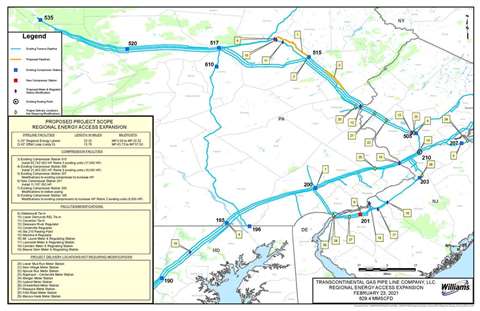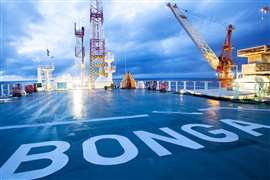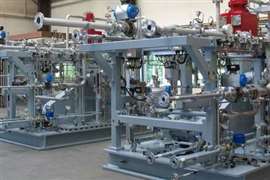FERC approves Transco’s natural gas expansion
February 21, 2023
 (Map: Williams Companies.)
(Map: Williams Companies.)
In January, the Federal Energy Regulatory Commission (FERC) greenlighted the Regional Energy Access Expansion (REAE) project in New Jersey, Pennsylvania and Maryland. The project will expand the Transco natural gas pipeline system’s capacity by 829,000 dekatherms a day. Owned by the William Companies, the 10,000-mile pipeline system moves 15% of the nation’s gas from Texas to New York City.
FERC heard opposing opinions regarding the need for the US$950 million expansion, but in the end the commission voted 4-0 to clear the way for the project.
Williams Companies said the project will provide greater access “to cleaner, cost-effective energy to serve the Northeast region by the 2023-24 winter heating season. The project supports the broader goal of meeting the growing regional demand for cost-effective, clean and reliable natural gas. It will help ease supply constraints affecting customers in Pennsylvania, New Jersey and Maryland, providing enough natural gas supply to serve approximately 3 million homes.”
Williams also argued the project will be constructed in a way that is adaptable to future renewable energy sources, such as hydrogen and renewable natural gas.
The project consists of a new electric motor-driven compressor facility in Gloucester County, New Jersey, along with a 22.3-mile pipe lateral in Luzerne County, Pennsylvania and a 13.8-mile pipe loop in Monroe County, Pennsylvania, and modifications to five existing compressor stations, according to Williams Companies.
Opponents of the pipeline, including some landowners and environmental groups, had planned to ask FERC to reconsider its vote. FERC stayed its January 11 decision to give those opponents 30 days to seek an appeal.
In 2022, New Jersey’s Board of Public Utilities and its rate counsel told FERC that the additional gas capacity was not needed, according to a study commissioned by the board, saying the state was unlikely to experience natural gas shortages through the end of this decade. The study, which was conducted by London Economics International, found that under normal winter weather conditions, the current infrastructure was adequate, but that in cases of extreme cold, such as a winter day that could not be expected to occur but once in 90 years, the current system would fall short by 153,000 decatherms per day, or 2.7% of the current supply system. “However, if New Jersey meets even half ots building electrification goals and/or has effective voluntary demand reduction with higher energy efficiency program targets, the shortfall risk disappears,” according to the study.
Ed Potosnak, executive director, of the New Jersey League of Conservation Voters maintained the expansion “will undermine New Jersey’s goal of reducing greenhouse gasses 50% by 2030 and would actually lead to a 16% increase in our total greenhouse gas output annually.”
But FERC said in its decision that regional gas utilities have already contracted for all the capacity on the expansion, signifying the need for the project. The commissioners also said that New Jersey’s capacity data did not apply to out-of-state power users.
“We find that Transco has demonstrated a need for the Regional Energy Access Expansion Project, that the project will not have adverse economic impacts on existing shippers or other pipelines and their existing customers, and that the project’s benefits will outweigh any adverse economic effects on landowners and surrounding communities,” FERC said in its conclusion.
Commissioner James Danley dissented from the part of the order that allowed a stay of the order for 30 days to give opponents of the project time to mount an appeal attempt. He noted that Williams Companies has cautioned that a delay in authorization could “threaten [their] ability to meet critical construction windows established to protect certain threatened and endangered species” and that “[m]issing those construction windows would delay construction and postpone the in-service date by up to 12 months, preventing this vital (and fully subscribed) natural gas pipeline capacity from being placed into service in time for the 2023-2024 winter heating season.””
He added, “Has the Commission, in staying the certificate, all but guaranteed that this project—one that the Commission has already found to be required by the public convenience and necessity—will not go into service in time for the 2023-2024 winter season and by the targeted in-service date of December 1, 2023?”
Commissioner Allison Clements said that she concurred with the decision to authorize the project, but questioned whether FERC’s 1999 Certificate Policy Statement -governing what factors the commission can consider in such cases - should be updated.
“Twenty years ago, the Commission was primarily concerned about assuring there would be sufficient natural gas transportation capacity to serve growing demand for natural gas,” Clements wrote. “Now, a combination of market forces and federal, state, and local climate protection policies may lead to flat or declining demand for natural gas over time. The circumstances impacting the need for new pipeline capacity are an order of magnitude more complex than they were in 1999, but our policies and practices have not evolved to address that complexity.”
MAGAZINE
NEWSLETTER

CONNECT WITH THE TEAM








